Best 7 Dog Foods to Feed your Adult and Puppy Poodle in 2024
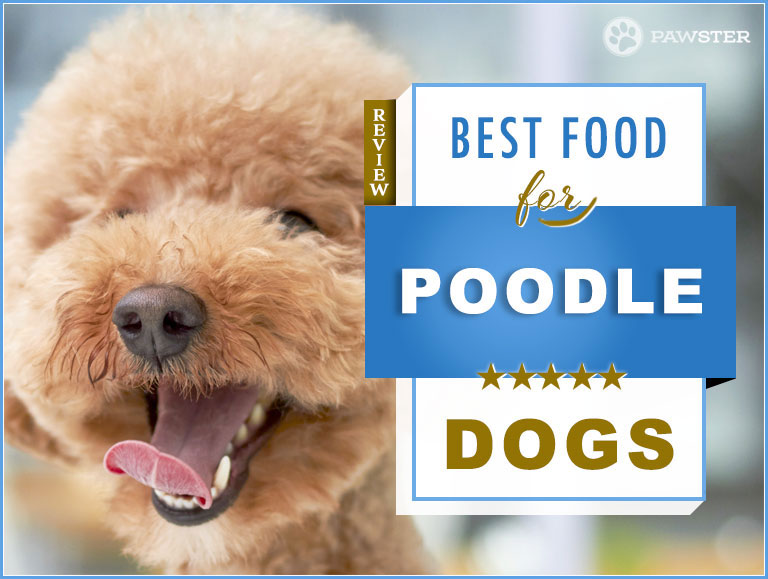
Contents of Article
- What is the Best Dog Food for a Poodle?
- General Nutritional Recommendations
- Best Dog Foods to Feed a Poodle
- Ollie Healthy Turkey Feast
- Earthborn Holistic Primitive Natural
- Fromm Adult Gold
- Wellness CORE Grain Free Original Formula
- What is the Best Food for Poodle Puppies?
- Wellness Small Breed Complete Health Puppy Turkey, Oatmeal & Salmon Recipe
- Canidae Grain Free Pure Foundations Puppy Formula
- Nulo Freestyle Puppy Salmon & Peas Recipe
- Special Dietary and Nutritional Considerations
- What is the Best Dog Food for My Poodle?
- Conclusion
In the U.S. Poodles come in three different sizes or varieties: the Standard, Miniature, and Toy. These varieties are very similar in temperament and appearance other than their height, though the Standard Poodle is usually recommended for families with younger children. Poodles are squarely-built and elegant. The coat is naturally curly. There are a number of different ways to groom the Poodle coat. Most pets are clipped into low maintenance cuts. Show dogs have clips that require more maintenance. Poodle coats can even be grown out and kept corded (“dreadlocks”). Poodles come in a wide range of colors.
When it comes to Poodle foods, there are many choices. It can be hard to narrow down what you should feed your dog. You want to take into consideration the breed and their traits as well as your dog’s specific dietary needs, sensitivities, or allergies. We have made it a little easier by choosing what we think are the best seven choices for poodles. Read on to learn more about what we chose.
What is the Best Dog Food for a Poodle?
- Ollie Healthy Turkey Feast Fresh Dog Food
- Earthborn Holistic Primitive Natural
- Fromm Adult Gold
- Wellness CORE Grain Free Original Formula
- Wellness Small Breed Complete Health Puppy Turkey, Oatmeal & Salmon Recipe
- Canidae Grain Free Pure Foundations Puppy Formula
- Nulo Freestyle Puppy Salmon & Peas Recipe
General Nutritional Recommendations
While dogs can digest plant proteins, they digest animal protein more efficiently. Dogs that consume a diet containing mostly plant protein sources may need more protein than a dog that eats a diet that is mostly made up of animal protein sources. If your dog isn’t getting enough energy from dietary fat and carbohydrates in his diet, his body will use dietary protein that would normally go toward growth or maintenance of body functions for energy. This is not good for your dog’s health or metabolism so it’s important that your dog has a well-balanced diet. The protein he eats needs to be easily digestible, preferably featuring some good quality animal protein, along with fat and carbohydrates for energy.
The Association of American Feed Control Officials (AAFCO) currently recommends that adult dogs, including Poodles, should have at least 18 percent protein in their diet. Growing puppies should have at least 22 percent protein in their diet.
Good quality dog foods today can be very high in protein. Some foods are extraordinarily high in protein. Canine nutritional experts generally recommend foods with higher (animal-based) protein, moderate fat, and low carbs for healthy adult dogs today.
Good quality sources of animal protein include meats, poultry, eggs, and fish. Animal sources of protein usually have complete amino acid profiles which means they include all 10 of the essential amino acids that a dog needs. “Essential” means that the dog’s body can’t synthesize the amino acid by itself so the amino acids have to come from foods or supplements in the diet.
Unlike animal protein, plant proteins don’t necessarily provide these essential amino acids. Some of them may have to be added to the dog food as supplements by the pet food manufacturer. This is one of the reasons why it’s important for a quality dog food to have an animal-based protein as one of the first ingredients. If your dog isn’t getting these essential amino acids in his food then he’s not eating a complete and balanced diet. Plant-based proteins can provide some of the amino acids your dog needs but your dog would have to eat a wide range of these plant-based proteins in order to get the essential amino acids found more easily in one or two meats. Foods that include both animal and plant-based proteins can be a good choice for many dogs since they often feature a well-rounded amino acid profile.
Per the Whole Dog Journal:
In today’s highly competitive dog food market, dog owners have been besieged with information about “protein quality.” Some scientists argue that the source of a protein doesn’t matter, as long as all amino acids are present in a form the dog can utilize. But “quality” does matter; it refers to the amount that must be consumed by the dog in order to fulfill his amino acid requirements. Therefore, the factors of digestibility and amino acid levels and types determine protein quality. The higher the biologic value of a protein, the less the amount of that protein is needed in a diet.
In short, if you’re feeding your Poodle a good quality dog food with protein that has a high biologic value, you will likely be able to feed less of the food since your dog will be able to digest and use the food more efficiently.
Along with meeting your Poodle’s need for protein, you will also need to make sure he has the correct amount of fat in his diet. While humans tend to think of fat as something to avoid, the right amount of fat is beneficial for your dog. It provides him with concentrated energy. Certain fatty acids, such as omega-3 and omega-6, support good skin and coat health. Plus, essential fatty acids (EFA) help the body absorb important vitamins such as A, D, E, and K. Here again, fats from animal sources are usually better for your dog than those from plant sources, primarily because they are easier for your dog’s body to use them. Good quality sources of animal fat include salmon oil and chicken fat. Some people like a plant source of omega-3 fatty acid such as flaxseed oil which is found in many dog foods. However, unlike salmon oil and other fish oils, flaxseed oil is in the form of ALA (alpha linolenic acid). ALA an inactive precursor to EPA and DHA – the active forms of omega-3. Dogs are not very good at converting ALA to EPA and DHA so giving them flaxseed oil is not a very efficient way of trying to add omega-3 to their diet.
AAFCO recommends that adult dogs have a minimum of 5 percent fat in their diets. Puppies need a minimum of 8 percent fat in their diets since they are growing (often rapidly) during their first year and need plenty of energy. EPA and DHA (active forms of omega-3 fatty acid from fish) have been found to be especially good for growing puppies , helping in brain development, among other things. There are some good puppy foods that include EPA and DHA in their formulas. You normally won’t have to worry about these minimum fat percentages for your Poodle (adult or puppy). Virtually all dog foods today have higher fat percentages than these figures with the exception of some weight control dog foods. You will probably need to worry more about the opposite end of the fat spectrum. Many dog foods – including good quality foods – are quite high in fat. Most experts recommend that – for a healthy adult dog – the fat percentage in a dog food should be about half of the protein percentage. So, if you are feeding a dog food that has 28 percent protein, then 14 percent fat would be appropriate. You can generally consider dog foods that have between 12 and 16 percent fat (dry matter basis) to be moderate in fat by today’s dog food standards.
Too much fat in your dog’s diet, along with too many calories and not enough exercise, can lead to your Poodle becoming overweight or obese. Some dogs can experience pancreatitis from eating too much fat in their diet. Cardiac problems and other health issues are also linked to diets that are too high in fat.
You will often read that dogs don’t “need” carbohydrates but this isn’t exactly true. In the rush to condemn filler ingredients in lower quality dog foods, many people have also condemned all carbohydrates in dog foods. This is unfortunate because many carbohydrates play several important roles in your dog’s diet. They are a primary source of energy for the body’s functions. They are also important in digesting other nutrients in the body. Whole grains such as rice and corn, tubers such as potatoes and sweet potatoes, and legumes such as beans and peas all contain large amounts of complex carbohydrates. Most of the carbs in dog foods are broken down by enzymes in the small intestine or gut and absorbed as glucose or simple sugars so they can be used as energy.
Along with providing energy for your dog, carbs are divided into soluble carbohydrates or insoluble carbohydrates. Insoluble carbohydrates don’t provide much energy to your dog but they are a source of fiber. The fiber absorbs water as it passes through your dog’s digestive tract, helping him to feel full. You will often find weight control dog foods with this kind of insoluble carbohydrate/fiber since it prevents a dog from eating too many calories. On the other hand, too much insoluble fiber in the diet of a normal dog can result in gas/flatulence, loose stools, and gastrointestinal upset. It’s a good idea to pay attention to the kind of carbohydrates in your dog’s food as well as the overall percentage of fiber. Most kibbles usually have between 4-6 percent (DMB) fiber.
As for carbohydrate percentages in kibbles, many dog foods today have between 30 and 50 percent carbohydrates. Pet food manufacturers are not required to list the carb percentage on pet food labels or on their web sites. In order to figure the carbs in a food you can check dog food reviews like those on here at Pawster. Or, you can figure the dry matter basis (DMB) for a food, though this sometimes involves some guesswork since you need to know (or guess) the ash percentage of the food. (For very precise figures you can contact the company and ask them about the carbohydrate or ash percentages.) Many dog food experts recommend that dog foods should not have more than 20-30 percent carbohydrates. However, there are many good dog foods that have more than 30 percent carbohydrates. Even many grain free/gluten-free dog foods can have higher amounts of carbs since they use non-grain ingredients that also contain carbohydrates. So, we suggest looking for dog foods with low to moderate carbs – but don’t be surprised if some of the foods you like have higher carb percentages.
Along with satisfying your Poodle’s need or protein, fat, and carbohydrates, your dog also needs certain vitamins and minerals in his diet. Some dog food companies meet these requirements by including lots of fruits and vegetables in a food but, truthfully, pet foods are typically cooked at such high temperatures that the vitamins and minerals in the ingredients can lose their potency. To make up for this loss of nutrients most pet food companies add more vitamins and minerals to their recipes. Depending on the company, they may use different kinds of vitamins and minerals such as synthetic, chelated, natural, and so on. Most companies do have to source some of their vitamins and minerals (known as “condiments” in the pet food industry) from countries outside the U.S. such as France, China, Canada, and other places. You can often find this information on the company web site if the country of origin concerns you. In some cases there may not be any other places to obtain a certain mineral.
Many dog foods today also include digestive enzymes/fermentation products or probiotics for digestive health. Finally, you should try to avoid foods that contain sweeteners, artificial colors, flavors, and preservatives. Artificial preservatives include ethoxyquin, butylated hydroxyanisole (BHA), butylated hydroxytoluene (BHT), tert-butyl hydroquinone (TBHQ), and propyl gallate. Vitamin E, Vitamin C, and certain plant extracts such as rosemary oil are often used as natural preservatives.
Best Dog Foods to Feed a Poodle
Ollie Healthy Turkey Feast
Healthy Ingredients : Turkey breast, turkey liver, kale, carrots, lentils
Key Features :
- Human-Grade
- Fresh foods
- Subscription service
- Auto-ships direct to your door
Ollie Healthy Turkey Feast
Ollie Healthy Turkey Feast is a human-grade, fresh dog food that is delivered right to your doorstep based on a profile you fill out when you sign up. The food is slow cooked in small batches to preserve nutritional integrity.
Fresh food options are becoming more popular in the world of pet food, as they have in the world of human food. Ollie dog food is known for human-grade recipes delivered fresh to your doorstep based on a delivery schedule that works for you. Although it costs more compared to regular dog food, it has a lot of benefits for keeping your dog healthy and active. Ollie has a few different recipes that you can choose from based on which protein you choose. The Healthy Turkey Feast includes carrots (which are full of phytonutrients for eye health), blueberries (which are high in antioxidants), and chia seeds which are a source of copper, zinc, and manganese. All Ollie dog foods are cooked slowly to preserve nutrients and they don’t use any preservatives or fillers. They also include super foods such as chia to help support your pet’s active lifestyle. You can rest-assured, when feeding your dog Ollie, that you are choosing a premium food.
Earthborn Holistic Primitive Natural
Healthy Ingredients : Turkey Meal, Chicken Meal, Potatoes, Chicken Fat (Preserved with Mixed Tocopherols), Whitefish Meal
Key Features :
- L-carnitine to convert fat to muscle
- Easily digestible
- Low in carbs
- Gluten and grain free
Earthborn Holistic Primitive Natural
Earthborn Holistic Primitive Natural is grain and fluten free. It is high in protein and has omega fatty acids for skin and coat health. It also has L-carnitine to help the body convert fat to muscle and energy.
Earthborn Holistic Primitive Natural is grain free and gluten-free. It is high in protein. The first five ingredients are turkey meal, chicken meal, potatoes, chicken fat (preserved with mixed tocopherols), and whitefish meal. It also has antioxidants such as blueberries and cranberries. L-carnitine helps convert body fat into muscle and energy. It has balanced omega-6 and omega-3 fatty acids. And it’s easily digestible. Earthborn Holistic Primitive Natural has 38 percent crude protein and 20 percent crude fat. The food has 17.5 percent carbohydrates, making it very low in carbs compared to most dog foods today. And it has 445 kcal/cup. This is an all life stage food. We think this is a very good food for many dogs, including Poodles. If your dog can’t eat some of the ingredients in this food, Earthborn has a number of other formulas with some novel proteins.
Fromm Adult Gold
Healthy Ingredients : Duck, Chicken Meal, Chicken,Brown Rice, Pearled Barley
Key Features :
- Salmon oil for skin and coat health
- Pro and prebiotics
- No corn, wheat, or soy
- Good source of protein
Fromm Adult Gold
Fromm Adult Gold is for growth and maintenance. It is a great source of protein and has salmon oil to support healthy skin and shiny coat.
Fromm Adult Gold is a growth and maintenance formula food which makes it suitable for dogs of all ages. It has 24 percent crude protein and 16 percent crude fat with 408 kcal per cup. The first three ingredients are duck, chicken meal, and chicken for good sources of meat protein. It also features salmon oil, which is an excellent source of omega-3 fatty acid for healthy coat and skin. And it has added probiotics and prebiotics for good digestive health. The food has no corn, wheat, or soy. Fromm makes their foods at their own manufacturing facilities in Wisconsin. This food does contain potatoes some some people may not like it for this reason but we think this is a good food for many Poodles. Fromm also makes grain free foods and foods for small breeds. Their small breed formulas may appeal to people with Toy and Miniature Poodles.
Wellness CORE Grain Free Original Formula
Healthy Ingredients : Deboned Turkey, Turkey Meal, Chicken Meal, Peas, Potatoes
Key Features :
- Grain and gluten free
- No artificial flavors
- Great for adult dogs
- Supports healthy joints
Wellness CORE Grain Free Original Formula
Wellness CORE Grain Free Original Formula is a good choice for your adult poodle. It is high in protein and moderate in fat. It doesn’t have any fillers or artificial flavors, and it doesn’t have any grain or gluten.
This recipe is a maintenance dog food so it’s not appropriate for puppies but it’s a good choice for adult dogs. The food is high in protein with 34 percent crude protein. It is moderate in fat with 16 percent crude fat. It has 421 kcal/cup. The first five ingredients in the food are deboned turkey, turkey meal, chicken meal, peas, and potatoes. This formulas has no meat by-products or fillers. It contains no artificial flavors or preservatives. Standard Poodles can sometimes have hip dysplasia so this formula includes glucosamine and chondroitin for joint health. It also has probiotics and fiber for good digestion, along with omega fatty acids for good coat and skin. Wellness CORE Grain Free Original Formula is completely grain free. It’s also gluten-free and it has no corn, wheat, or soy. If you have a Toy or Miniature Poodle, Wellness CORE also makes formulas for small breeds, as well as canned formulas.
What is the Best Food for Poodle Puppies?
Every puppy deserves to start life with good nutrition. Good health as a puppy usually translates to a healthier, longer life as an adult dog. Your Poodle puppy will certainly benefit from eating a good quality, nutritious puppy food for the first months of his life. Here are some foods that we recommend for Poodle puppies.
Wellness Small Breed Complete Health Puppy Turkey, Oatmeal & Salmon Recipe
Healthy Ingredients : Deboned Turkey, Chicken Meal, Oatmeal, Salmon Meal, Ground Barley
Key Features :
- DHA for brain and eye development
- Good source of protein
- Antioxidants and omega fatty acids
- High fiber
Wellness Small Breed Complete Health Puppy Dog Food
Wellness Small Breed Complete Health Puppy Turkey, Oatmeal & Salmon Recipe is made for smaller dogs. It is a good source of protein and has DHA for brain and eye development.
Wellness makes many good dog foods and puppy foods. We like Wellness Small Breed Complete Health Turkey, Oatmeal & Salmon Recipe for smaller puppies like Miniature and Toy Poodles but they also have puppy formulas that would be suitable for Standard Poodle puppies. The first five ingredients in this formula are: deboned turkey, chicken meal, oatmeal, salmon meal, and ground barley. So that’s a lot of good animal protein along with some high fiber grain that encourage good digestion. This formula also include DHA for good puppy brain development. And it has antioxidants as well as a good proportion of omega-6 and omega-3 fatty acids for health coat and skin. The analysis shows that the food has 28 percent crude protein and 19 percent crude fat. It has 489 kcal/cup which should provide plenty of calories for a small Poodle puppy.
Canidae Grain Free Pure Foundations Puppy Formula
Healthy Ingredients : Chicken, Menhaden Fish Meal, Lentils, Peas, Potatoes
Key Features :
- Vitamins and minerals
- Probiotics for digestion
- Grain-free
- Limited ingredient formula
Canidae Grain Free Pure Foundations Puppy Formula
Canidae Grain Free Pure Foundations Puppy Formula has probiotics for good digestion and antioxidants for a healthy immune system. It is grain free and is vitamin-rich.
Canidae makes some good dog foods for all dogs but we especially like some of their puppy foods. Canidae Grain Free Pure Foundations Puppy Formula is a limited ingredient formula that has nine ingredients plus vitamins, minerals. This food is grain free with probiotics for good digestion. It also has antioxidants for a healthy immune system. And it has omega-6 and omega-3 for a beautiful coat and healthy skin. The food has 30 percent crude protein and 12 percent crude fat. The first five ingredients are chicken, menhaden fish meal, lentils, peas, and potatoes. Since this is a limited ingredient formula with probiotics it is especially food for puppies with sensitive digestion. This food has 520 kcal per cup so it has more calories than some puppy foods but this can make it good for many smaller puppies who need more calories for growth. You should keep in mind that you don’t have to feed a lot of food with some of the very calorie-dense puppy foods.
Nulo Freestyle Puppy Salmon & Peas Recipe
Healthy Ingredients : Deboned Salmon, Turkey Meal, Menhaden Fish Meal, Whole Peas, Chicken Fat
Key Features :
- No potatoes or tapioca
- High-quality protein
- DHA for eye and brain development
- Specifically for puppies
Nulo Freestyle Puppy Salmon & Peas Recipe
Nulo Freestyle Puppy Salmon & Peas Recipe is a source of high-quality protein. It has DHA for brain and eye development and it does not contain any potatoes or tapioca.
Nulo is known for having lots of good quality meat in their foods and this puppy food is no exception. In this formula, 80 percent of the protein comes from real meat. The food also has DHA fatty acids to support brain and eye development. This formula contains no potatoes or tapioca. The first five ingredients are: deboned salmon, turkey meal, menhaden fish meal, whole peas, and chicken fat (preserved with mixed tocopherols & citric acid). It had 30 percent crude protein and 17 percent crude fat and it has 428 kcal/cup. We think Nulo Freestyle Puppy is a good choice for your Poodle puppy.
Special Dietary and Nutritional Considerations
Since Poodles come in different sizes you may want to choose a dog food that is formulated for your Poodle’s size. Small dogs like the Miniature Poodle and the Toy Poodle can use up more calories than the larger Standard Poodle, even if they are all spending time at home. There are many good dog foods made specifically for small/Toy breeds that have extra calories per ounce to meet the needs of small dogs. Dry dog foods usually have smaller kibble pieces so they are easier for small dogs to chew.
If you are training your Poodle or doing some very active work such as agility, hunting, or one of the many activities these versatile dogs can do, you may need to choose a food that has a slightly higher fat and calorie content. Your dog will be burning more calories if he’s getting lots of exercise so he will need food that provides more energy.
Dog foods provide suggested feeding guidelines but you can calculate more precise daily calories for your dog. Average-sized dogs need about 30 calories per pound/per day. Small, active days (less than 20 pounds) need about 40 calories per pound/per day. Large dogs (over 50 pounds) may need as few as 20 calories per pound/per day. Calorie needs depend on your dog’s activity level and other things that affect his metabolism. Spayed/neutered dogs usually need fewer calories. If your dog is working or training hard, he will need more calories. A Standard Poodle weighing 50 pounds will generally need about 1312 calories per day but this figure can be adjusted depending on your dog’s age, activity level, and other factors. A Miniature Poodle weighing 15 pounds will need about 532 calories per day. This amount can be adjusted. And a Toy Poodle, weighing just 6 pounds, will need about 267 calories per day, which can be adjusted depending on age, activity, and so on. Most Poodles, of all sizes, are active dogs, so you they will probably need all of these calories, or a little more.
Puppies need more calories while they are growing than adult dogs. There are calculations, tables, and charts you can use to figure these calories. Puppies up to the age of four months grow at an exponential rate so they need lots of calories. After that time they still need plenty of calories but they start to taper off until they become adults. You can use this chart as a guideline for how many calories your puppy needs at different stages and weights. If you have any doubts about your puppy’s weight, keep in mind that it’s usually better for a puppy to stay slim. Overweight/obese puppies can go on to develop arthritis or other bone and joint problems as adults because of the stress put on their bones and joints while they are developing.
Most Poodles will do well eating a good, balanced dog food. Some Poodles do have food allergies, sensitivities, or other skin problems. In these cases you may need to work with your veterinarian to determine the ingredient(s) that trigger a reaction in your dog. She may suggest an elimination diet where your dog eats one protein and one carbohydrate. After a few weeks, individual ingredients are gradually added to your dog’s diet to see if he reacts. This approach does take some time but it’s one way to find out, for sure, what your dog is allergic to. Or, if you know the ingredients that bother your dog, you can try to buy a food that doesn’t contain them. You may want to consider a limited ingredient diet (LID) or a hypoallergenic dog food since these foods won’t contain the most common dog food allergens. A dog food with a novel protein source may help. If you have problems finding a commercial diet that works for your dog, there are prescription or veterinary diets that might help. You can talk to your veterinarian about them.
What is the Best Dog Food for My Poodle?
Many dog foods are good for all dogs, regardless of their size or age. You may want to start looking at some of these foods for your Poodle. These foods are usually AAFCO-approved for “All life stages.” You can feed these foods to puppies, adult dogs, and senior dogs. They are often a good choice for any size dog as well. Just watch the calories and pay attention to whether your dog is gaining (or losing) weight on the portions you feed. Otherwise, you may want to look for foods that are specifically formulated for your Poodle’s size such as foods for small/Toy breeds.
Here are some good foods that we like for adult Poodles:
| Poodle Dog Food Comparison Table | |||
| Rank | Product | Price | Rating |
| Human Grade |
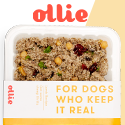 |
Varies |
A+
|
| #1 |
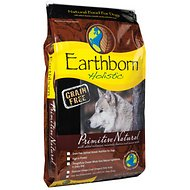 |
$1.86/lb |
A-
|
| #2 |
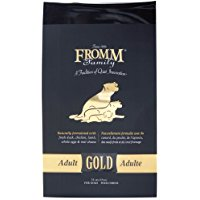 |
$1.33/lb |
A
|
| #3 |
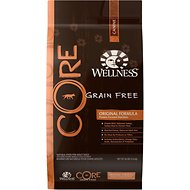 |
$2.31/lb |
A+
|
| #4 |
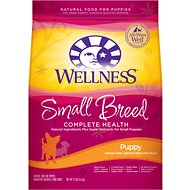 Wellness Small Breed Complete Health Puppy Turkey, Oatmeal & Salmon Recipe |
$2.77/lb |
A+
|
| #5 |
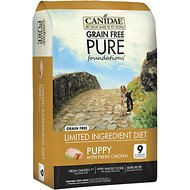 |
$2.37/lb |
A
|
| #6 |
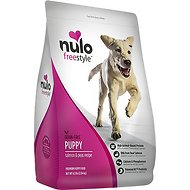 |
$2.43/lb |
A
|
Conclusion
There are lots of very good dog foods and foods for puppies today. These are just a few suggestions. You can choose from foods with raw-infusions, organic foods, biologically-appropriate foods with more protein, and the list goes on. What’s important is to find the food that suits your Poodle best. Use what you’ve learned about your Poodle’s nutritional needs and apply it when you select a dog food formula. If you need some help, check out the foods recommended here, or some of the foods recommended on Pawster.

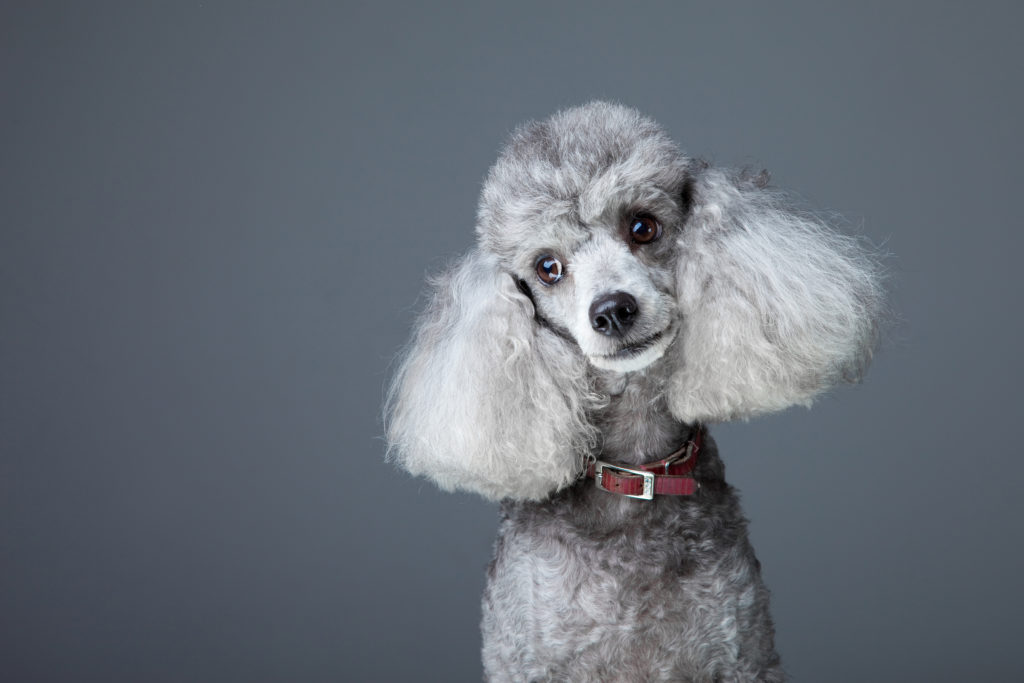
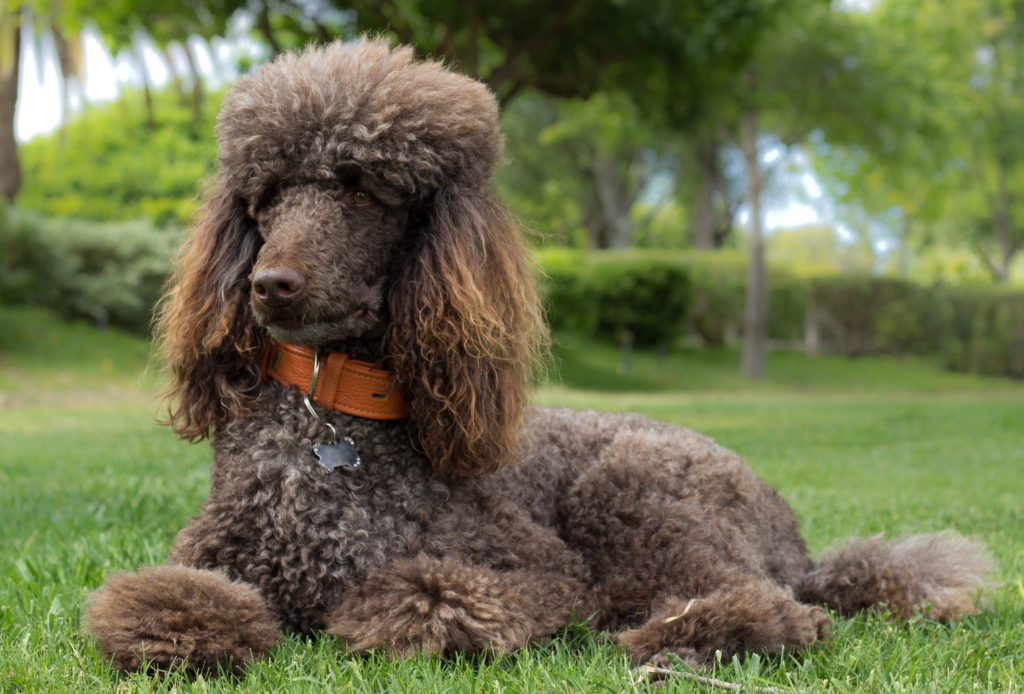

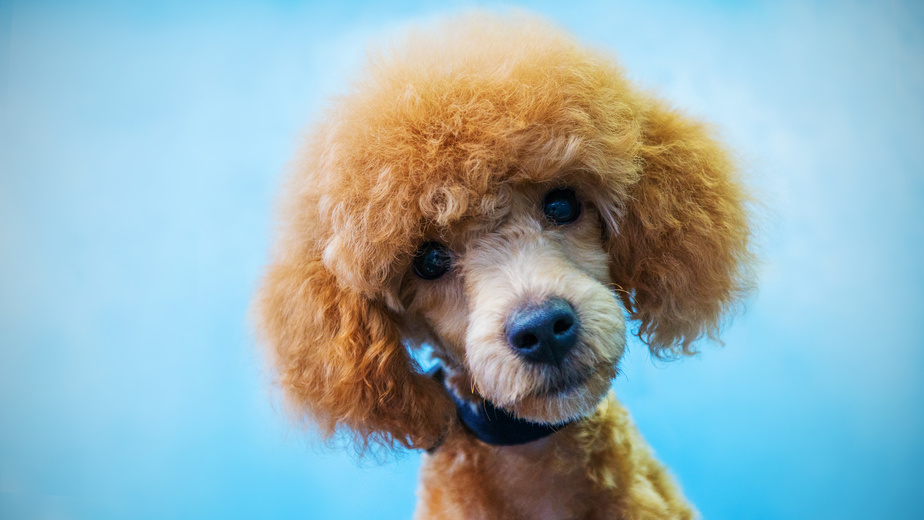
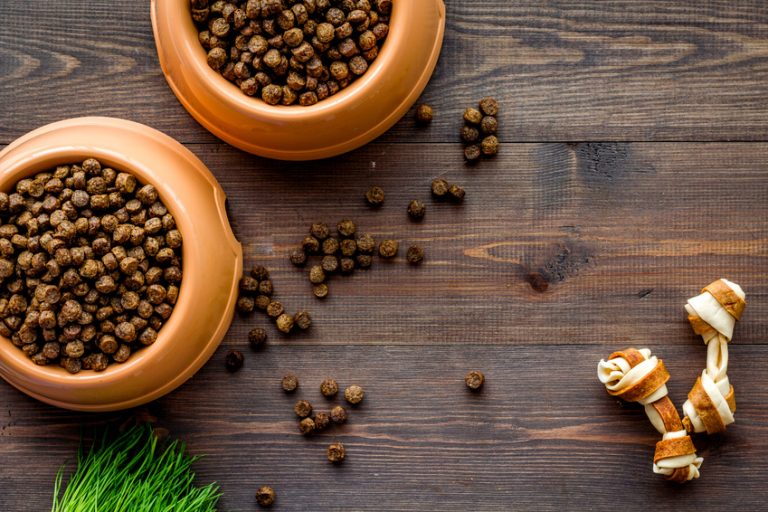
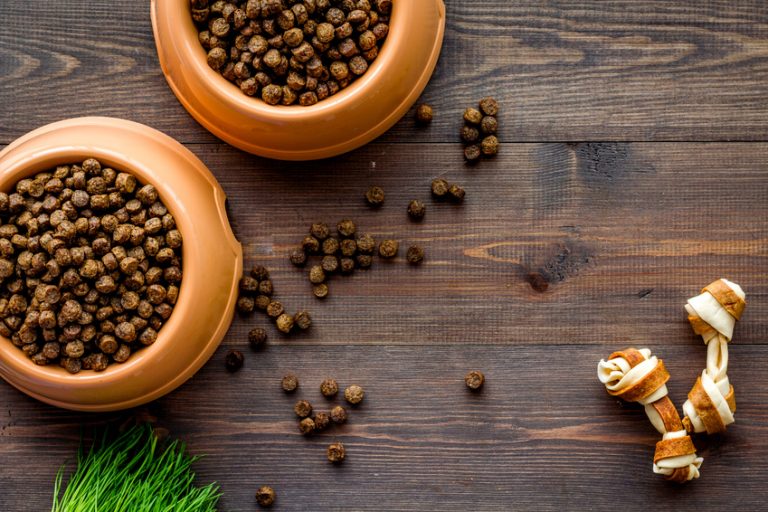
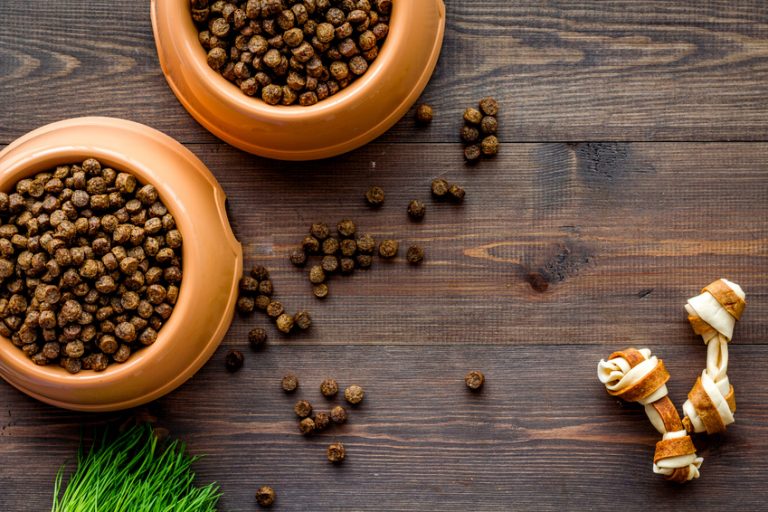
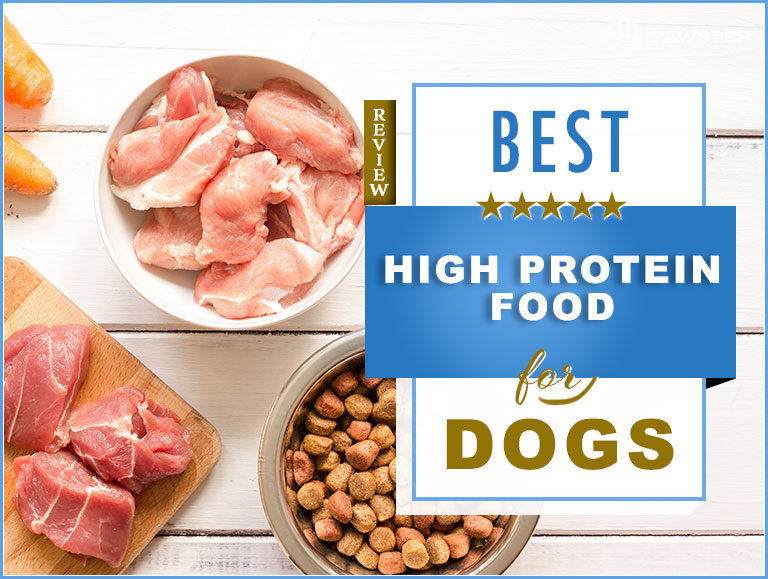
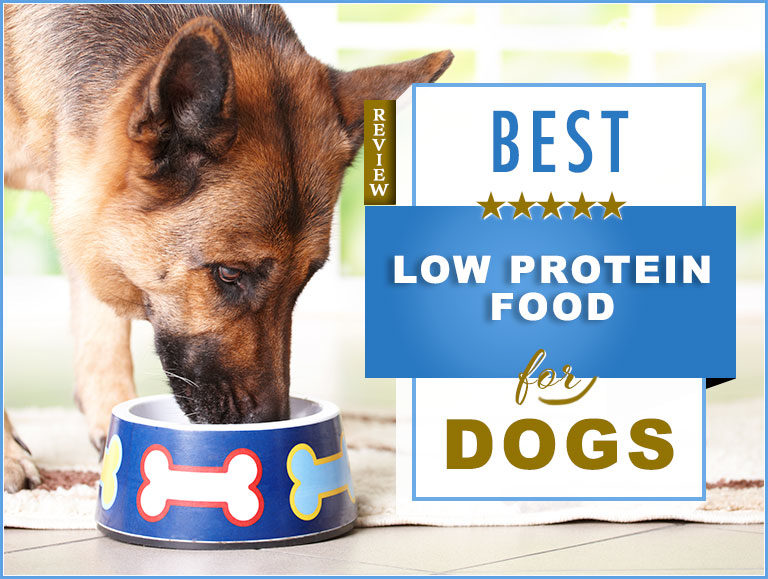
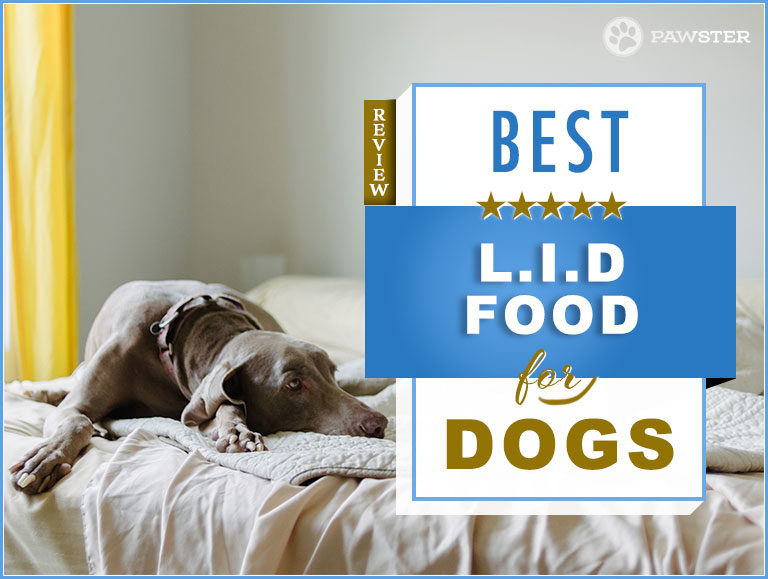
I have an 8 year old toy poodle and only feed her the best dry and wet food on the market. The problem is she is constantly tearing from her eyes staining her beautiful white coat. I’ve tried Angel treats, eye wipes, Angel added to her food. I never buy any food with by products or anything that isn’t made with pure meat or chicken. I always give her grain free food as well. I keep her groomed every 6 weeks. I’m at my wits end!! Can you please give me some advice about this problem. She is the love of my life and the most precious dog I’ve ever had! Thank you so much, Gingys mom